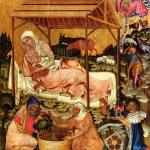That’s where Silesius’ words come in. His short poem at first seems banal enough—a mere suggestion that, if we know God, we know that harming others is a waste of time. But the deeper significance lies in what it means to “not cause harm.” Understood in light of the thoughts above, the poem points to the sense of peace we experience when not narcissistically expecting others to reflect our own positions and implicit ways of thinking. It’s a goad to humility, charity, patience, and trust.
Without, I hope, belaboring the point too much, I’d like to point to one more literary example of the harms of narcissistic expectation: John Milton’s Satan. In Paradise Lost, Satan prepares to leave Hell and finds the gates guarded by two horrifying creatures, ones he doesn’t recognize. Transformed by the Fall, their visages—like his own—have been wholly and terrifyingly altered. In reality, however, they are Sin and Death. He gave birth to the former from his mind, impregnated her, and thus she gave birth to their incestuous son, the latter figure. This is brilliant allegory (a dark parody of the Trinity, among many other things), but it also emphasizes the self-love that drives Satan’s actions. Thus Sin says:
Hast thou forgot me then, and do I seem
Now in thine eye so foul, once deemd so fair
In Heav’n, when at th’ Assembly, and in sight
Of all the Seraphim with thee combin’d
In bold conspiracy against Heav’ns King,
All on a sudden miserable pain
Surprisd thee, dim thine eyes, and dizzie swumm
In darkness, while thy head flames thick and fast
Threw forth, till on the left side op’ning wide,
Likest to thee in shape and count’nance bright,
Then shining Heav’nly fair, a Goddess arm’d
Out of thy head I sprung; amazement seis’d
All th’ Host of Heav’n back they recoild affraid
At first, and call’d me Sin, and for a Sign [ 760 ]
Portentous held me; but familiar grown,
I pleas’d, and with attractive graces won
The most averse, thee chiefly, who full oft
Thy self in me thy perfect image viewing
Becam’st enamour’d, and such joy thou took’st
With me in secret, that my womb conceiv’d
A growing burden. (II.747-767)
He is attracted to her because she is like him “in shape and count’nance bright.” He finds his own “perfect image” in her and “becam’st enamour’d.” In short, Death comes from Satan’s own self-love, his mirror image—sin. His obsession with himself and his own rebellious mind leads to an incestuous pairing, the entrance of death into the world. The allegory here is complex, but only one point is important for my purposes: Satan is the perfect example of narcissistic expectation. He effectively wishes to mate with himself rather than deal with the many differences that divide entities of all sorts (certainly I know I have had moments when I wish I could date someone very similar to me, only to have to remind myself how horrible that would be). This is a romantic example (one that, with certain modifications, does often play out in real life), but the principle extends to all manner of facets of life. Humility must triumph over narcissism, peace over bitterness, genuine love over vanity.
I’ll close with some more Silesius:
In waste God hides the gold, accept what He may send,
The great within the small, though we don’t comprehend.













